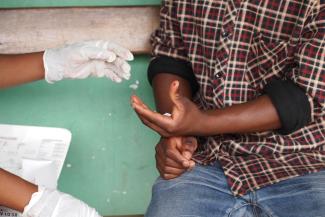The Open Doors project is focused on increasing access to, and use of, comprehensive HIV prevention, care and treatment services for key populations in Zambia. Globally, key populations are defined as a group who, due to specific higher-risk behaviors, are at increased risk of HIV infection. This includes female sex workers, men who have sex with men, injection-drug users, and transgender individuals. As a direct result of their lifestyle, key populations are frequently stigmatized and criminalized, which limits their access to HIV and other health services. Across Open Doors project sites, it is estimated that there are approximately 57,268 members of these key populations alone.
Open Doors’ Services:
The Open Doors project works across eight districts, employing innovative social networking strategies to reach their clients with lifesaving services in a safe, confidential setting. Key populations are essential to informing project interventions, and play an important role in peer-to-peer education and service linkages. At their clinics and in community settings, Open Doors provides the following:
- STI screening and treatment;
- HIV testing, counseling, and linkage to treatment for those who test positive;
- Family-planning method mix, condoms and lubricants;
- Pre-exposure prophylaxis (PREP) for HIV negative clients;
- Voluntary medical male circumcision;
- Intimate-partner violence screening and support; and
- Alcohol addiction and mental-health harm-reduction services.
|
JOURNEY TO SELF-RELIANCE
USAID believes every person, every community, and every country wants to be empowered to lead their own future. We support self-reliance by walking alongside our friends on their development journey, as evolving but enduring partners. As partners on this journey, we are empowering host-country governments and our partners to achieve locally-sustained results, helping countries mobilize public and private revenues, strengthening local capacities, and accelerating enterprise-driven development. This approach fosters stable, resilient, and prosperous countries that are more self-reliant, and prioritizes enduring partnerships.

